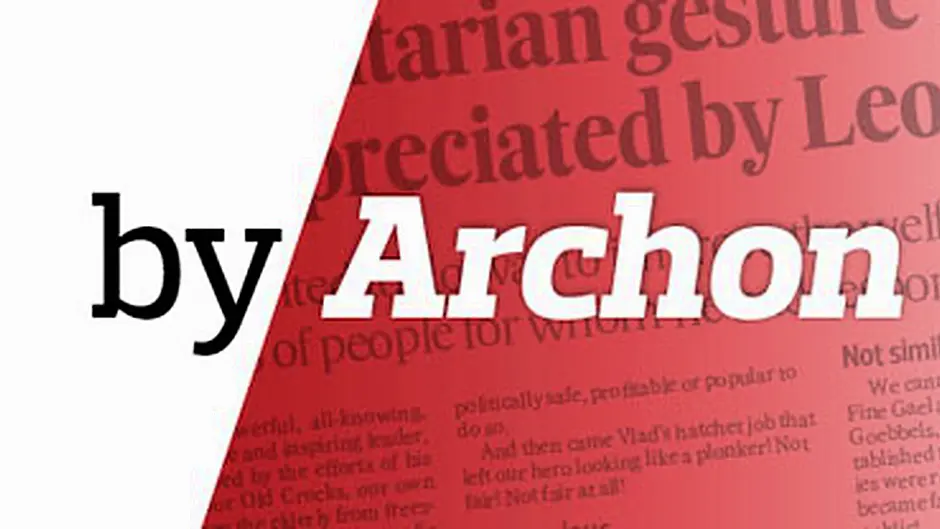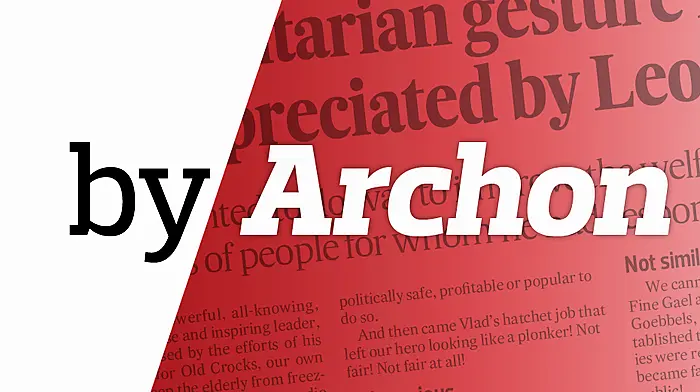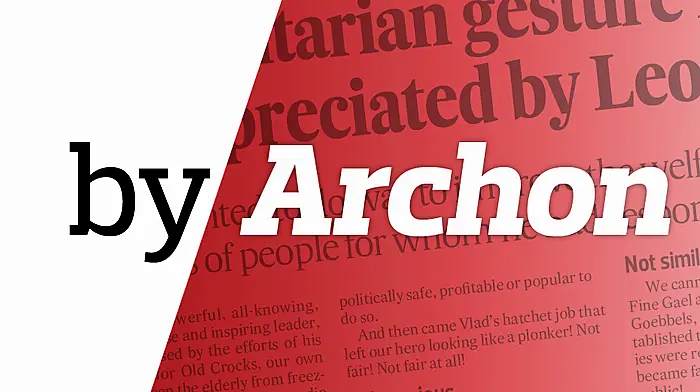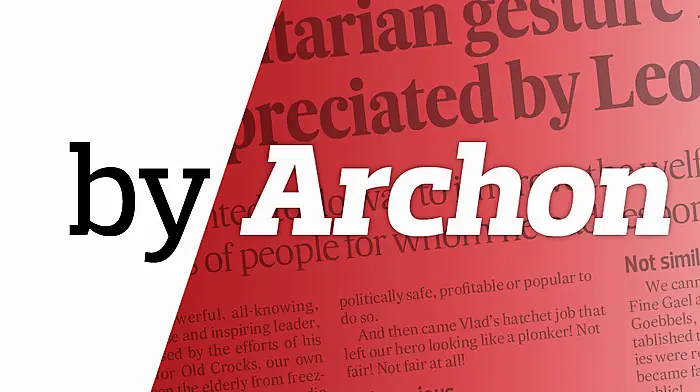When introducing proposed legislation, the term ‘euthanasia’ was not used, but rather the hotch-potch expression ‘dignity in dying’
LAST week, the trendy buckos in Dáil Éireann, introduced a proposal for a free vote on a matter that could change profoundly the nation’s attitude to life and death. Euthanasia! It is a topic that has the potential to convulse Irish society in a fashion not seen since the abortion issue.
Currently the government has in the pipeline the hugely controversial ‘Dignity in Dying Bill’, whose purpose is (in effect) the legalisation of euthanasia and assisted suicide.
Up to this, nobody advocated putting euthanasia onto our statute books and then, suddenly from nowhere, it became a hot topic with the weird Green Party, Vlad’s Fine Gael and Mickey’s Fianna Fáil.
According to the HSE, euthanasia can be defined as ‘the act of deliberately ending a life to relieve suffering’ and that a doctor who deliberately encourages a very sick patient to take a fatal overdose of medicine could be accused (in theory) of euthanasia.
In other words, euthanasia is the act of assisting or encouraging very ill people to kill themselves.
And here’s the rub: our legislators already are toying with quasi-euthanasia legislation in their promotion of the so-called ‘Dignity in Dying’ Bill, which has been described as ‘making provision for assistance in achieving a dignified and peaceful end to life.’
The choice of words is interesting. When introducing the proposed legislation, Vlad, Mickey and the Trendies did not use the term ‘euthanasia’ but rather the hotch-potch expression ‘dignity in dying’ which suggested style, seriousness and something worthy of consideration.
Contrary to ethics
In much of the civilised world, euthanasia is considered morally and legally unjustifiable, inherently wrong and contrary to the 2,500-year-old medical ethic of caring for patients. But, incredibly, in Paddy’s neck of the woods, that no longer seems to be the case.
A People before Profit enthusiast put forward the Bill advocating euthanasia and it was supported by Green Party windbags and elements within Fianna Fáil and Fine Gael.
All were confident that a ‘free vote’ on euthanasia would be allowed and that ‘inter-party flexibility’ would prevail on the issue.
According to Greenie Eamon Ryan, a ‘free vote’ is the best solution as this avoids dividing the House on party political grounds should matters of ‘complex conscience’ (his terminology) arise in Dáil Éireann.
Vlad prudently agreed with the kicking to touch approach, declaring that he wanted an all-party Oireachtas Committee to look into the matter of suicide! So far, the Dáil is metaphorically ‘out’ as to defining what exactly constitutes ‘assisted suicide.’
Of course, the topic is not exactly a barrel of laughs, or votes! And, despite the best efforts of Fine Gael and the weirdo Greenies to invest the act of suicide / murder with parliamentary-style propriety and good taste, the fact of the matter is that euthanasia is nothing more than messily killing yourself as a way to avoid pain or suffering.
Legal or illegal?
Euthanasia may sound like a student exchange programme but, according to Google (which has the best definition), it is nothing more than ‘the painless killing of a person suffering from an incurable and painful disease or in an irreversible coma.’
Sensitive to the legal and other implications inherent in advocating suicide for terminally-ill people, it is not surprising that Vlad and his Justice Minister, Helen McEntee, want to kick the debate as far away from themselves as possible. Hence, the proposal to hand the topic over to the totally useless, so-called Citizens’ Assembly.
In the meantime, the position regarding euthanasia in this country is that it is either manslaughter or murder and, consequently, illegal under Irish law. What’s more, to encourage deliberately, or to assist another person to kill themselves (‘assisted suicide’) can be punishable by life imprisonment.
And, interestingly, although ‘assisted’ suicide is illegal, attempting to commit suicide unaided and without outside help is not an illegal act.
Euthanasia is legal only in Belgium, Holland and Luxemburg, although – according to the HSE – ‘some types of assisted suicide and passive euthanasia’ are legal in Switzerland, Germany, Mexico and the American state of Oregon. Assisted suicide is not legal in Britain and those promoting it runs the risk of a 14-year prison sentence.
Assisted suicide is where encouragement and assistance is given to another person who commits, or attempts to commit suicide, such as in the case of purchasing powerful sedatives, knowing that the person with the terminal illness intends to take an overdose with the intention to kill themselves. Involvement in carrying out euthanasia can lead to a murder charge.
Assisted death
In the three European Union countries where euthanasia is legal, a person must make a voluntary request to end their life, have the mental capacity to make such a decision and must be suffering unbearably with no prospect of an improvement in their condition.
In the Netherlands in 2017, there were 6,585 cases of voluntary euthanasia or assisted suicide, mostly involving people with cancer.
In Britain some doctors argue that, in cases of terminal illness, individuals should be allowed the freedom to determine their own time in which to die, and that police should not prosecute those involved in an ‘assisted’ death.
Crucially, there is no guarantee that helpers who take a family member to Switzerland for an assisted death will not be investigated by the police.
People with dementia
Almost in a throwback to Dr Mengele, there is concern among psychiatrists and doctors about the use of euthanasia for people with dementia. Two years ago, police investigations were opened into the euthanasia of psychiatric patients in the Netherlands after reports that pressure was put on people with disabilities to end their lives.
And then there’s the possibility that those who promote euthanasia may not be familiar with the benefits of palliative care and how it can improve the quality of life when a patient is faced with a life threatening illness. Assisted dying isn’t necessary when good clinical care can help eliminate pain.
Indeed, when politicos focus on euthanasia as a means of reducing suffering, they may well be sending the message that some lives are not worth living and that the sick and the elderly are little more than a financial burden on society.
In such circumstances, it isn’t long before the ‘right to die’ becomes a ‘duty to die’!










